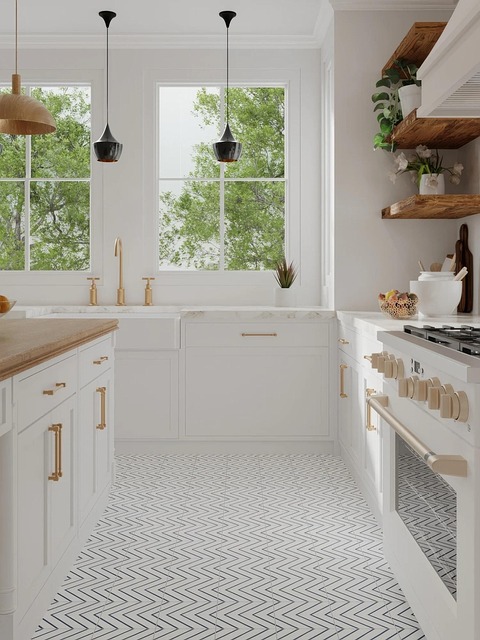Designing an energy-efficient kitchen involves choosing appliances with advanced technologies like smart sensors and precise controls for water and electricity conservation, prioritizing durability and recyclability for reduced environmental impact. Key components include efficient cooling systems, water-conserving dishwashers, induction cooktops, and microwave sensors. Professional installations should focus on high-rated appliances, natural lighting, insulation, and sustainable materials to maximize utility savings and minimize carbon footprint. Industry leaders like LG and Siemens offer smart appliances that optimize energy usage without compromising performance or aesthetics, revolutionizing kitchen sustainability practices.
Transform your kitchen into an eco-friendly oasis with professional installations designed for sustainable living. In today’s world, energy-efficient kitchens are not just a trend but a responsible choice. This comprehensive guide explores innovative solutions to create a smart, efficient, and stylish space. From selecting top-tier energy-efficient appliances to implementing cutting-edge smart home automation, every aspect is covered. Discover the latest in sustainable cabinetry materials and design trends, plus effective water conservation strategies. Embrace a greener lifestyle without compromising on performance or style.
- Choosing Energy-Efficient Appliances for Your Kitchen
- – Types of energy-efficient appliances
- – Benefits and features to look out for
- – Examples of leading brands and models
Choosing Energy-Efficient Appliances for Your Kitchen
When designing or renovating a kitchen, prioritizing sustainability means more than just selecting eco-friendly materials. The heart of a sustainable kitchen lies in energy-efficient appliances that significantly reduce utility consumption and environmental impact. Look for models with Energy Star ratings, which guarantee lower electricity usage without compromising performance. Modern refrigerators, dishwashers, ovens, and washing machines come equipped with advanced technologies designed to conserve energy and water. These include features like precise temperature controls, smart sensors, and efficient filtration systems.
Investing in these appliances not only contributes to a greener planet but also translates to long-term savings on your energy bills. Additionally, consider the overall lifecycle of the appliances, choosing products that are durable, easily repairable, and recyclable when no longer in use. With a thoughtful selection, your kitchen can become a beacon of sustainable living, setting an example for eco-conscious choices in other areas of your home.
– Types of energy-efficient appliances
In the pursuit of creating energy-efficient kitchens, a variety of appliances play a pivotal role in reducing environmental impact and lowering utility costs. These include refrigerators with advanced cooling systems that use less electricity while maintaining optimal temperatures, dishwashers designed to conserve water and energy through high-pressure washing and efficient heating elements, and ovens featuring convection technologies that cook food faster and more evenly while using less power.
Additionally, energy-efficient ranges and cooktops incorporate induction technology, which heats cookware directly instead of warming the air around it, significantly reducing energy wastage. Other notable appliances are microwave ovens with sensor functions that adjust power levels based on food volume and type, ensuring efficient heating every time. These innovations contribute to a well-rounded approach towards creating sustainable kitchens that not only benefit the environment but also offer long-term financial savings for homeowners.
– Benefits and features to look out for
When considering professional installations for sustainable kitchens, there are numerous benefits and features to look out for. Energy-efficient kitchens top the list, offering significant cost savings on utility bills while also reducing your carbon footprint. Look for appliances with high energy-star ratings, smart technology that allows for precise temperature control, and water-saving fixtures like low-flow faucets and efficient dishwashers.
Additionally, incorporate natural lighting and proper insulation to maximize daylight and minimize heat loss. Sustainable materials such as recycled countertops, bamboo flooring, and eco-friendly cabinets not only contribute to a healthier environment but also add aesthetic appeal and durability to your kitchen space. These features not only enhance the functionality and comfort of your kitchen but also make it a more attractive and valuable asset for your home.
– Examples of leading brands and models
In the realm of sustainable living, energy-efficient kitchens are no longer a trend but a necessity. Leading brands and models are at the forefront of this revolution, offering innovative solutions that not only reduce environmental impact but also enhance functionality and aesthetics. For instance, companies like Siemens and LG have pioneered smart appliances that optimize energy usage through advanced sensors and technology, ensuring your kitchen operates efficiently without compromising performance.
One notable example is the LG InstaView Door-in-Door Refrigerator, which boasts a transparent glass panel allowing you to view inside without opening the door, reducing cold air escape and saving energy. Similarly, Siemens offers induction cooktops that heat cookware quickly and evenly while consuming less energy than traditional methods. These brands, among others, are reshaping the landscape of energy-efficient kitchens, fostering a more sustainable and eco-conscious approach to daily life.
Incorporating professional-grade, energy-efficient appliances into your kitchen design is a smart step towards creating an eco-friendly space. By choosing the right hardware and understanding its benefits, you can significantly reduce your energy consumption without compromising on performance or style. Investing in these sustainable solutions not only contributes to environmental preservation but also offers long-term savings on utility bills. Embrace the future of kitchens by making energy-efficient choices that bring both functionality and environmental responsibility to your home.
